2020 Activity Report
March Activity Report
31 March 2021
Global Japan Office Coordinator
IWASAWA YUKIKO
At the beginning of March, I thought the spring weather would come and I would have a longer time to spend comfortably, but surprisingly, there were many days when the sun didn't come out, and especially in the middle of the month, there were cold days. I couldn't stop wearing thick gowns and sweaters every day, so I couldn't decide what to wear. (The temperature rose to nearly 30 degrees on the day I write this diary, and I think I can finally change my wardrobe.) It has been so cloudy with no rain that Taiwan is facing a serious water shortage. The water level of 17 dams is less than 50%, and more than half of them are under 20%. The weather will continue to be good from next month, so I'm worried if the situation will get worse.
As the new school year started, my classmates asked me more often, "Can I go to consult in Japanese?". The leaflet we created last month has a good reputation, and we are often told that they saw it posted on the bulletin board of the department. (I have been post it since before ...)
Last month, I received an email from the second years student in the Japanese language department who said, "I want to practice the interview.". I thought it was an interview for a job, but it was an interview for an exchange student on campus. I checked how to enter the room and when to bow, and asked questions that she might actually be asked at the interview. The purpose and motive of studying abroad were clear, so there seemed to be no problem. I advised her not to be nervous, but to relax and work hard.
A second-year master's student in the Japanese language department came to ask about the content of his thesis to read in class. There are many difficult expressions in the thesis, so I explained in as simple words as possible to understand the content. The student wanted to pursue a doctoral course at a Japanese graduate school, so I handed him over materials from Tokyo University of Foreign Studies.
I also corrected Japanese manuscripts to be presented in class for Japanese language students. Those were about the culture and art of Tamsui. They directly interviewed artists and mentioned the history of Tamsui in those writings, which were so informative.
Tamsui used to flourish as a port town, and there were many exchanges with other countries. There are many ruins and buildings from that time, and you can feel the history just by taking a walk. When the corona is over, I sincerely hope that Japanese students will feel the charm of Tamsui firsthand.
As spring break begins at the end of this month, Students are not allowed to enter the campus on April 5th (Mon). I am thinking of opening GJO on other days to adjusting the schedule.
February Activity Report
28 February 2021
Global Japan Office Coordinator
IWASAWA YUKIKO
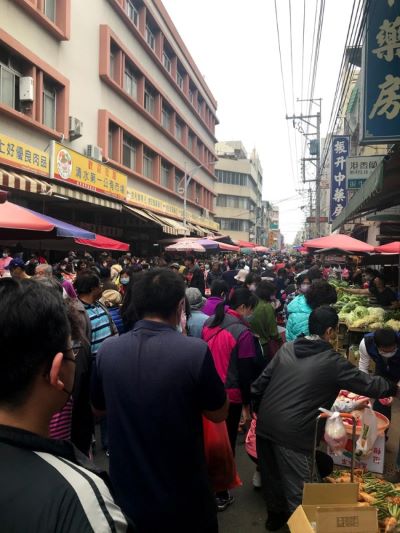
After the final exams in January, the students started their winter vacation one after another, and from the beginning of February, there was no sign of people in the university campus or in the literature center with the GJO office, making for a sad atmosphere. I set up a Facebook page for GJO Taiwan and planned to interact online with the students during the winter break, but the students who often visit GJO seemed to be busy preparing for the Chinese New Year and didn’t respond.
I couldn’t go back to Japan on Chinese New Year’s Day this year, so I thought it would be a lonely vacation, but I was invited over by a friend and could spend New Year’s Eve in Taichung.
Last year was the time when the coronavirus started to spread, so the market that was bustling with New Year’s shopping was deserted, and it was an unusually lonely Chinese New Year. However, thanks to the strong cooperation of the government and citizens, this year’s Chinese New Year, which was able to contain the epidemic of the coronavirus, was able to regain its usual vigor.
After the Chinese New Year, I corrected the Japanese of two graduate students who will make a presentation at an external university next month. In order to graduate from the Master’s Program in the Japanese Language Department at Tamkang University, students must present their theses on campus as well as at other universities. (There is a rule that if you can’t participate in the presentation outside, you can help twice on the day of the conference.) Since they were graduate students, there weren’t any major mistakes in Japanese, but I made adjustments to make the differences between intransitive and transitive verbs and also passive expressions more natural.
It took me a while to understand the contents of the thesis because it dealt with old literary works. It seems easy to correct sentences, but actually it takes a lot of time and brains. I want to finish it during GJO’s working hours, but I suddenly thought “Ah, this word has more nuance in that sentence.” and I revised it over and over again.
I can’t even imagine writing a thesis in Chinese myself, so I always feel respect for students who use difficult Japanese words.
I received an inquiry from an undergraduate who wants to practice for interviews next month (March), so I would like to work on the interview measures by referring to the books in the GJO office.
January Activity Report
31 January 2021
Global Japan Office Coordinator
IWASAWA YUKIKO
Although January 1 is a national holiday in Taiwan that commemorates the establishment in Nanjing by the Republic of China on January 1, 1912 as a temporary government, there is not much of a New Year’s atmosphere. I went to see a play while looking sideways at the congratulatory LINE messages that were sent to me one after another from family and friends in Japan. The theater hall and shops were open as usual, and it didn’t look so different from other holidays.
With regard to the coronavirus, since January 1, the entry of foreigners into the country has become stricter, requiring them to submit negative certificates for PCR testing. Despite submitting a negative certificate, many people are confirmed to be infected during the quarantine period, making it difficult for Taiwan, which is globally recognized for its Corona program, to completely prevent infections from overseas.
This month, medical personnel were infected with the coronavirus at a Taoyuan hospital, and restaurants and public facilities that were visited during the incubation period of the virus were disinfected, and people working there were asked to voluntarily isolate.
The students who came to the GJO did not stay for a long time, maybe because of the final exam or the influence of the coronavirus. There were days when there were no guests, so it was a slightly lonely month.
On January 4, a Taiwanese lecturer in the Japanese language department visited our GJO office. I answered a simple questionnaire about teaching Japanese.
For the past few months I have supported students attending online classes at Japanese universities, but the students have a high level of Japanese and have completed online programs with little support.
I feel that the students who study Japanese at Tan Jiang University are highly motivated to study and have a very high language level. I sometimes feel frustrated with my lack of ability, thinking that I should be able to teach in accordance to each student’s uniqueness.
From 2/5 to 2/18, the GJO office will be closed as Tanjiang University will have a winter vacation. Therefore, we are planning to open a new Facebook page to interact with students online during winter vacation.
December Activity Report
31 December 2020
Global Japan Office Coordinator
IWASAWA YUKIKO
The temperature in Taiwan in winter is not so low, but I still find it difficult to get by as many classrooms don’t have heating and have the windows open, and I am sensitive to cold weather. It’s humid, so I feel the sensible temperature is lower. Students wearing down coats stand out in the school, and they walk close to each other. The GJO classroom has no heating or windows, so when I open the classroom, I feel the cold air. This month, many students came to consult me for a class presentation assignment.
In particular, we shared our thoughts with students who came to inquire about my thoughts on “Japanese exclusivity” regarding the problems of buraku (village or community), Zainichi (resident in Japan), and the recent foreigner training system (Technical Intern Training System). In Kyoto, where many foreigners live, this kind of discrimination was very familiar to me. There are many ethnic groups in Taiwan. I feel that education for people with various backgrounds to understand, respect, and coexist with each other is excellent. The problems of discrimination and bullying exist in every society, so I would like to learn from the attitude of everyone to solve these problems publicly, rather than concealing them.
In addition, at the request of the teacher of the Japanese language department, I corrected the reports of the students from the optional classes. I sent back the manuscript sent by the students with comments and a GJO flyer after correcting them at home, and the next day the students came to GJO to ask me some questions they didn’t understand. Although they had only studied Japanese for a year, their level of Japanese was so high that I asked them how they learned Japanese, and they said they learned Japanese through dramas and anime. But when I was told that they used Google Translate for my report, I couldn’t help laughing at their honesty.
From the night of December 14th, I was invited to a theater practice session in the Japanese language department and shared my acting experience. It was a short performance of about an hour, but I was glad that some students came to ask questions after the performance. It’s really hard to create plays in a foreign language, but by using your own body to speak Japanese, you can expect to learn the language better. I’m looking forward to next year’s performance and seeing the student’s growth.
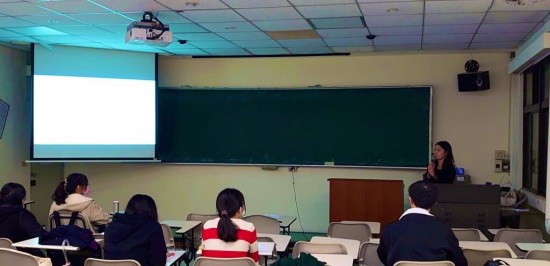
This month, for the first time in 253 days, there was an infection in the mainland, which heightened tension surrounding the Coronavirus. Fortunately, it hasn’t spread yet, but it’s really scary that we don’t know when, who gets infected, and where. Furthermore, from January 1, the Health Bureau announced that the visa application for foreign students would be postponed. It will be difficult for TUFS students to come to Taiwan for a visit. I hope this situation will somehow end around the world in 2021.
November Activity Report
30 November 2020
Global Japan Office Coordinator
IWASAWA YUKIKO
It’s November. The weather is still warm enough to wear short sleeves, and so many students have their meals or relax on the outside benches. So far, we don’t have many rainy days, so this winter could be a pleasant one.
There have been no domestic infections of COVID-19 in Taiwan for a while, but some positive cases have been confirmed almost every day among Taiwanese returning from abroad, and Southeast Asians coming to Taiwan on business. Therefore, we are required to always wear a mask in public places, and to take our body temperature upon entering classrooms. In Taiwan, our lifestyles are heavily affected by the preventive measures against COVID-19.
A chemistry student who is taking Japanese as an optional class came to practice speaking for the midterm exam. In the test, the student would be given a topic by the teacher 5 minutes prior to the test and would have to talk freely on the topic using Japanese. My former colleague in charge of GJO had left a box of papers with various themes written on them, which we were able to utilize for our speaking practice.
There were various topics such as “What were you most happy about recently?,” “What do you think about Japanese sweets?,” and “Tell us about your past school trips.” However, I was a little flustered when the student replied “I’ve never been happy.” and “I don’t think about Japanese sweets in particular.” When I started asking more and more questions, the conversation got lively at last. Conversations require a trigger, and I thought that if the student could create that trigger himself, the test would go well.
I also helped students to prepare for the Japanese Language Proficiency Test on Sunday in the first week of December. Together, we studied the meaning of words and how to read them while looking at some of the sample questions online. N1 questions seemed difficult even for a Japanese native, so I was surprised to see the Taiwanese students answering them with ease.
I also supported students attending online classes. When there was trouble in communication in Japanese, I translated Japanese into Chinese and explained what was happening in the class.
Next month, I was given the opportunity to give a lecture on theater for Japanese language students. While I have the opportunity, I will also be telling the students about what we do here at GJO.
October Activity Report
31 October 2020
Global Japan Office Coordinator
IWASAWA YUKIKO
October has arrived and the weather has settled down a bit. It has been raining lightly, and it has been cold at night, but during the daytime, you can stay comfortable enough with just short sleeves or a light jacket. However, when I walked into the classroom the other day, I felt quite cold as the air conditioner was on, just like in the middle of summer, even though the temperature outside was low. Since it’s warm most of the year, it seems that Taiwanese people don’t like the heat.
Last month we had students who wanted to practice daily conversation, but in October many of them came to ask me about their homework, probably because they have a lot of assignments to do in class this month. I always worry about how to correct the students’ Japanese when I help them with their homework. Even if I correct grammatical mistakes, if I don’t explain how they are wrong, the students wouldn’t be able to notice the same mistake in the future, and my advice would not be beneficial for them at all. When checking scholarship application forms, it is easy to correct Japanese mistakes since I am a native speaker, but I am always unsure of what to do when the content itself may require revising. Once I gave a student some simple advice about the content of the application, but I later realized that I may have meddled too much.
In the latter half of October, a student who wanted to interview a Japanese person who has previously taught Japanese came to our office. The student asked me, “What do you think is important to keep in mind when teaching Japanese?” and “What kind of skills do you think are necessary when teaching Japanese?” I still don’t have much experience, so I wasn’t able to give any good answers, but I said that good communication skills and flexibility, as well as a wide range of knowledge of the language is a must. Through supporting students who are studying Japanese, I have the opportunity to learn new things about Japanese and much more.
September Activity Report
30 September 2020
Global Japan Office Coordinator
IWASAWA YUKIKO
The long summer vacation has come to an end and the campus is back in business. With the help of the teachers of the Japanese language department, I was able to talk about GJO and its activities during and outside of classes with the freshmen. As a result, many students came to visit GJO this month.
A colleague of mine in the Japanese language department came with a question about a translation she came across.
In a Japanese animation the student recently watched, there was a line “I will love you no matter how old you are.” The words “how old” were translated as “any number of” in Chinese, so the student asked me if this was correct. I explained to her the correct meaning of the Japanese.
Many of the students in the Japanese Language Department are very interested in Japanese subculture (manga, anime, games, etc.), and want to work in such fields in the future. Anime and manga are Japanese textbooks for them. I love subcultures too, so we are able to have heated discussions on such topics, but sometimes the students start talking about very niche anime that is only broadcasted at midnight. When this happens, I can no longer keep up with the conversation.
There was also a student who brought material from Japanese language conferences held at other universities in Taiwan. I was asked about the meaning of “Dengaku” and introduced a little bit of the history of Japanese traditional performing arts. There are many students who know a lot about subcultures, but Japanese traditional performing arts are not as well known.
A student who has been coming to GJO since last year is thinking of studying in Japan next year. I consulted about studying abroad in Japan. As the student would like to go a university in the countryside and not in the city, I talked about the possibility of transportation being inconvenient. The student replied that even if that is the case, they will just buy a used car and explore the area by themselves. I was impressed by the independence and positivity.
I also received a request to correct the Japanese in a PowerPoint that would be used to present in class. It was written about the differences between the educational internships in Taiwan and Japan, and I too was able to learn a lot from it.
Next month, GJO activities are expected to get more exciting, with requests for Japanese language support from students who will attend classes at Japanese universities online, and with preparation for supporting the yearly drama classes that are held in June.
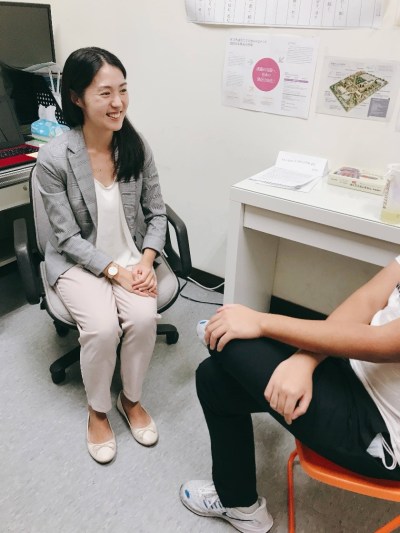
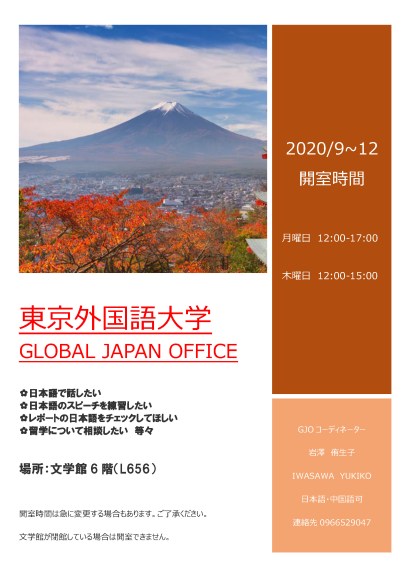
August Activity Report
31 August 2020
Global Japan Office Coordinator
IWASAWA YUKIKO
In August, summer arrived in full swing in Taiwan. The campus was deserted as it was in July, although there were general visitors taking summer classes and students taking entrance examinations for graduate school. Although I was planning to hold a Kyoto dialect workshop, my colleagues suggested that I postpone it to the end of September as not many people could participate this month, so I changed the schedule on my flyers.
Only a few students visited the GJO office this month, but I was asked to correct some Japanese theses online and accepted. Most of the papers written by students with a long history of studying Japanese had mostly nothing to correct, but I found some double phrases that even native Japanese tend to write, such as “a translated translation”. Until then, I had only taught simple conversation phrases and grammar, but the level of the vocabulary used and the content of the theses were at a much higher level, so I felt like I was being tested on my Japanese ability.
I would like to improve my Japanese so that I can be of help to the Taiwanese students who will be making their thesis plan presentations in November.
A new semester starts on September 14. Once school begins, I am planning on giving out GJO flyers during classes so that students who are not Japanese majors can also visit the GJO.
July Activity Report
31 July 2020
Global Japan Office Coordinator
IWASAWA YUKIKO
Hello everyone. My name is Iwasawa and I am in charge of GJO Taiwan from this month. Utilizing the experience and knowledge that I have accumulated through my previous work, I will be in charge of study support and study abroad consultation for students studying Japanese at Tamkang University.
This is my first report, so I would like to briefly introduce myself as a greeting.
I’m 34 years old and from Kyoto. My family casts temple bells and Buddhist statues and we have delivered peace bells not only within Japan but to many places all over the world. There are some temple bells which my parents cast here in Taiwan, which I would like to visit during my time here.
My parents’ house is in Uzumasa, Kyoto. This area holds many historical sites related to the Hata clan, which are of immigrant descent. Uzumasa is also a famous filming location. I was interested in theater since I was a child and had the opportunity to perform in many works at the Toei Kyoto Movie Studio.
After that, I decided that I wanted to study acting in depth, so I enrolled in the Department of Visual and Performing Arts at Kyoto University of Art and Design. After graduating, I moved to Tokyo and did a three-year internship at the New National Theatre.
I worked as an actress in Tokyo for a while, but before I turned 30, I decided that I wanted to brush up on my skills abroad, so I used a working holiday visa to go to Taiwan. Fascinated by the charm of Taiwan, I received a Taiwanese Language Scholarship from the Ministry of Education of Taiwan in 2018, and studied Chinese for one year at the Chinese Language Center of Fu Jen Catholic University. In the process, I became interested in the relationship between Taiwan and Japan during the Japanese occupation and the theater movement of the time, and decided to continue my research as a graduate student in the Department of Japanese Language and Literature at Tamkang University. Currently, in addition to doing my research for my dissertation, I am acting in Taiwanese commercials and films .
That is enough about me. Below is the activity report for this month.
The students started their summer vacation around the end of June, and the campus, including the area around the GJO which is usually filled with students, became quiet and deserted. In the first week, I created flyers and organized library material. In the second week, the university itself was closed, and there were days when I could not enter the building. During that time, I worked out plans for future events and received questions about Japanese from my colleagues who called me after seeing the flyers.
From the third week on, several students began to visit the office.
A Taiwanese blue magpie, the national bird of Taiwan, was born in a tree near the office. The parent bird perhaps saw that I was observing them and attacked me.
When I was talking to a student who visited the GJO about this, I was asked about Japan’s national bird. I had assumed that the crested ibis or the crane was Japan’s national bird, but when I looked into it, I learned that it was a pheasant.
Come to think of it, the pheasant was also depicted on the back of the old 10,000-yen bill. The students and I were also excited to learn about the national flower (chrysanthemum), the national stone (crystal), the national butterfly (purple emperor) and the national bacterium (malt).
This month, we had extremely hot days, and the temperature in July reached a record high of 38.9 degrees Celsius. It was dreadful trying to get to the sixth floor of the university from the main gate without an elevator. Most of the students went back to their hometowns or didn’t want to go out because of the heat wave, so many called or used LINE for online consultation. I hope that when the weather gets a little more bearable more students will visit the GJO.
Next month, I will be holding a workshop on the Kyoto dialect.
June Activity Report
30 June 2020
Global Japan Office Coordinator
Fumiya Saito
In June, summer has certainly arrived in Taiwan. There were days when the temperature exceeded 38 degrees Celsius, and the number of midsummer days increased, making it bothersome to go outside.
In Taiwan, regulations on COVID-19 were substantially lifted in June, and temperature testing became unnecessary at Tamkang University. I just hope it stays this way.
This month, we had our usual gatherings, and talked about Japanese mannerisms and Japanese and Taiwanese kanji. As for mannerisms, we talked about what is required when going into society, such as how to exchange business cards. I think I was able to introduce some necessary manners in Japan for students who are thinking about getting a job there. Under the topic of kanji, we talked about the kanji used in Japan and the kanji used in Taiwan (Traditional), and some similar but different ones that would most likely be marked wrong in official tests. For example, we talked about needing to be careful when writing kanjis such as “戻” , which in Taiwan is written like “戾”. There is a difference in whether or not there is an extra stroke. Also this month, a student came to me to ask about job hunting in Japan. There are big differences in the way you look for a job between Japan and Taiwan, so I talked about how to respond to questions in interviews and how to write a resume in Japan. The student seemed to feel uncomfortable in the way he was supposed to answer questions, so I explained some of the reason behind this.
We held a “Tanabata” event this month as usual. However, we changed the way we went about it compared to past years. Instead of a one-day event, we asked students to write “Tanzaku” (strips of paper) when they came to our room. Most of the students who participated were in fourth grade, so I think there were many wishes for the future.
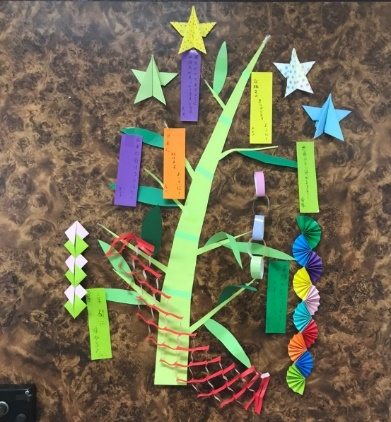
It was my last job of the month, and on my last day, students who often came to my room gathered together. Some even brought gifts. I am handing my position to my successor, with the hope that GJO Tamkang University will continue in its development.
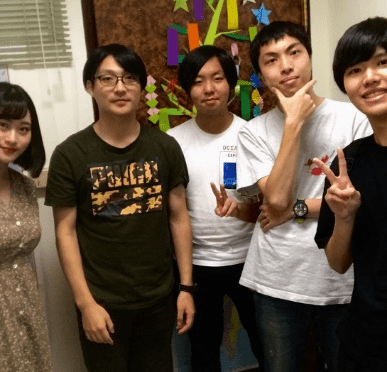
May Activity Report
31 May 2020
Global Japan Office Coordinator
Fumiya Saito
The number of days with temperatures exceeding 30 degrees Celsius has increased since the beginning of May, but I feel it is still somewhat cooler than the average year. Also, the rainy season started in the latter half of May, and the number of rainy days has increased. I have heard that it is easier to get sick when there are changes in air pressure, so caution is needed.
Due to the risks of COVID-19, the entrance to Tamkang University has been restricted since last month. However, this restriction was lifted mid month, and visitors can now enter the campus as before. In addition, although temperatures were being checked in each building, it has become no longer necessary for some buildings to do so, and the regulations are gradually becoming loosened. When I look around, the number of people wearing masks is decreasing, so I feel that the situation is calming down.
This month, we had our usual chats and gatherings, and students who wanted advice on Japanese homework as well as those who were thinking about Japan as their future destination after graduating from university came to our office for consultation. As for Japanese homework inquiries, I helped students understand how to use postpositional particles. As for career counseling, a student that had come to talk to me before to discuss applying for graduate schools in Japan, was now considering another career path due to the effects of COVID-19 and the cancellation of the Japanese Language Proficiency Test in July. I provided information with the help of the Internet.
I myself have decided to leave this position as a GJO Coordinator next month, so I explained my projects and duties to my successor. I also talked about other tasks that could help to optimize the working environment. I hope to do my best in making sure that my successor feels fully prepared for the job.
Next month, we are planning to hold the same Tanabata event as last year. However, many of the students who take past are seniors, and June is a busy time for them, so we will have to reconsider it’s arrangements.
April Activity Report
30 April 2020
Global Japan Office Coordinator
Fumiya Saito
In the first half of April, we had many rainy and cloudy days, the temperature was lower than usual, and it was cold for Taiwan.
Since the beginning of April, Tamkang University has implemented new measures, such as requiring students to wear masks during classes, due to the new coronavirus, and reduced the number of students allowed in a classroom, meaning classes of more than 100 students have had to move online. In addition, the number of visitors to the Tamkang University campus now has a limit, and students are required to present their student IDs when entering the campus. The general midterm and final exams of the university have been suspended, and it has been left up to the teachers in charge of each class to decide whether or not students will take these tests. Under these circumstances, some students came to the GJO to have me check their Japanese homework, and others came to learn how to read the kanji on the handouts they use in class, or to have me check the Japanese in their graduation reports. As for their Japanese homework, I checked and gave explanations on any mistakes. I also taught them how to read the kanji. There are many cases where topics develop from the printed materials and teaching materials that students use in class, and what I checked on that day was content related to the law of same-sex marriage in Taiwan, and according to the students, Taiwan has a special law apart from civil law and criminal law. Talking with the Taiwanese students also helps me learn about these things for the first time.
Regarding the Japanese of the graduation reports, I checked what the students sent me by email and replied. I’m glad to hear that they were able to submit them without issue.
The new coronavirus became a topic of conversation with the students who came to the GJO. The situation is not so bad in Taiwan, but in Japan, a state of emergency was declared and some students were worried. Also, there was a student who was planning a trip to Japan for his graduation trip, and I was also consulted about transportation and sightseeing spots, so I feel very disappointed when I think about how they had to cancel their trip due to this situation.
Since the beginning of April, measures against the new coronavirus have been strengthened, and we considered suspending the GJO’s activities temporarily, but the current situation is not so bad, so we would like to continue our activities for now.
